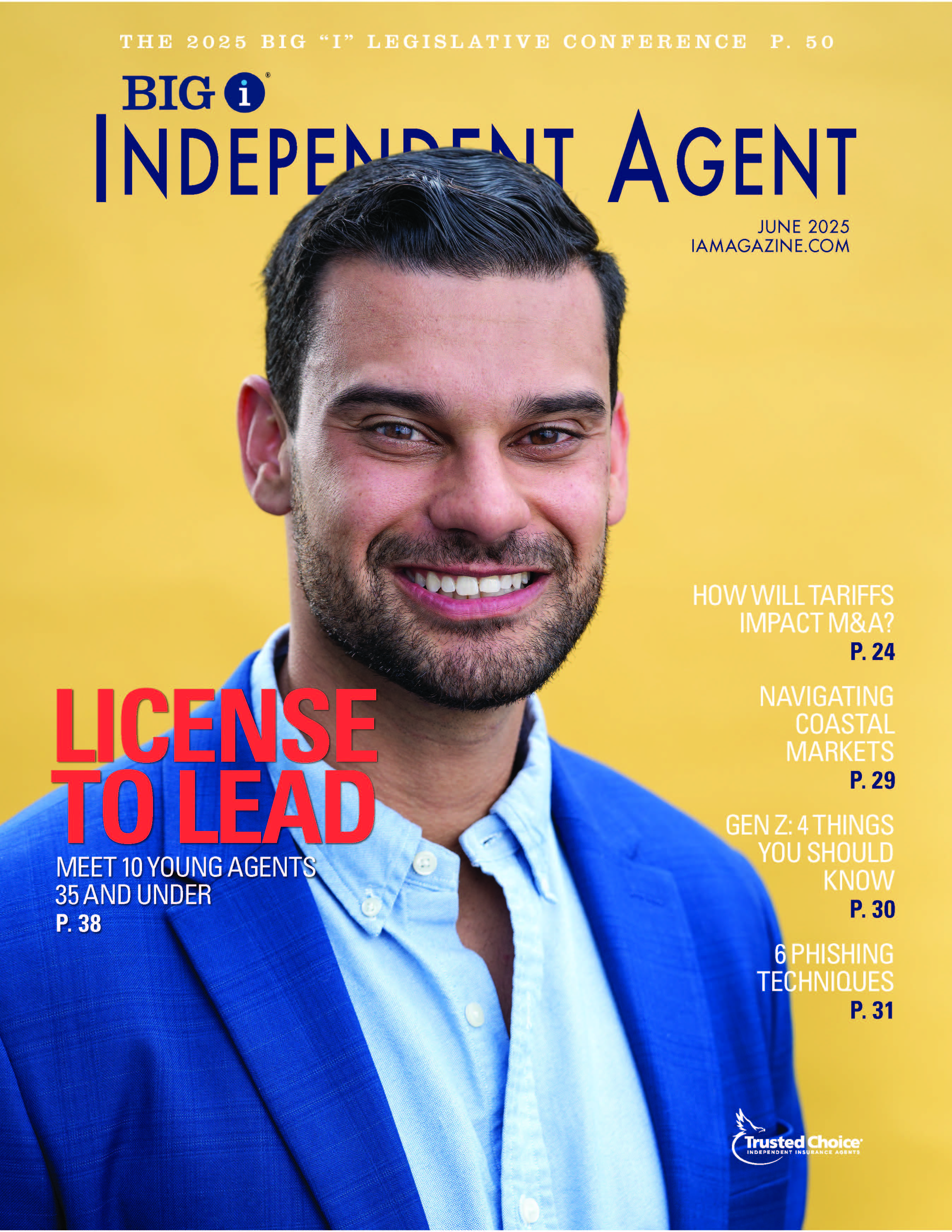Top 3 Pathways for IA Perpetuation

By: Jacquelyn Connelly
According to the 2014 Future One Agency Universe Study, 14% of independent agencies do not have a perpetuation plan in place.
But industry experts estimate the number is much higher.
“It’s more like 40%,” says Al Diamond, president of Agency Consulting Group, Inc. “A lot of people have an expectation, but they never put it on paper and they don’t tell their people. Everyone thinks all they’ve got to do is come to work every morning and sell insurance when the phone rings. Well, you can’t plan your business that way—especially if you’re over 50 or 60 or 70.”
“I would suggest even those that say they have a plan in place really don’t have a plan in place,” agrees Tim Cunningham, partner at OPTIS Partners, LLC. “Or they say something like ‘I’ve got a buy/sell agreement.’ That’s not a perpetuation plan. A perpetuation and succession plan is a long-term process, not an event.”
Feeling like a deer in headlights? Here are the top three perpetuation plans among independent agencies surveyed by the Agency Universe Study—and how you might go about implementing them at yours.
Children or other family members take over (38%)
“The good part about family perpetuation is that it’s normally the easiest to finance because it’s self-financed,” Diamond says. “We see a lot more of these family perpetuation issues being lifetime annuities to the parents to the older generation. Basically the children buy the agency, they keep paying their parents until the parents die and then they inherit it. There’s virtually no tax implication.”
So what’s the catch? “The biggest challenge is making sure the next generation is equipped to run the business,” says Mike Mensch, certified business intermediary and merger & acquisition master intermediary at Agency Brokerage Consultants. “Not everybody has the skills and the work ethic involved. If the agents are about 60 then their kids are in their 20s—that’s a young age to take over a business.”
At Northern Insuring, a former Best Practices agency in Plattsburgh, New York, perpetuation planning is deeply embedded in family commitment. Third-generation Deena Giltz McCullough, president & CEO, and her brother Randy Giltz, senior vice president, acquired the agency from their father, Rod Giltz. “My dad was very clear when I came into the business in 1986 and my brother in 1990 that he felt that I would be the next president,” Giltz McCullough says of the transition, which became reality in 2008 after planned gifts of stock throughout the 1990s and 2000s.
“When you talk about succession planning, it’s a matter of whether the person who’s sitting in that top spot is willing to relinquish control,” Giltz McCullough says. “My father would say, ‘If I’m getting in the way, let me know.’ And he never has—we’ve always had a good dialogue around it.”
As chairman and CFO, Rod continues to hold an active role in the agency, managing his own book and the agency’s 401(k) plan as well as other financials. But Giltz McCullough now owns 51% of the stock and her brother 49%. “We’ve moved it forward,” she says. “It’s now our business, and yet really nothing’s changed.”
What’s next? Northern Insuring is strongly considering filing for Women Owned Business status and recently completed a conversion from a C to S Corporation. “That was really about positioning the agency for options in the future,” Giltz McCullough says. “From a taxation standpoint, it just expands the number of options we have.”
Other principals buy all or part of the current principal’s interest (29%)
This perpetuation plan is often the easiest transition for employees and customers—as well as for sponsoring loans—and could happen through an equal partnership or grooming a younger employee from a minority partner to a perpetuator. “It won’t involve any drastic changes, they won’t lose a lot of clients—it’s a good method of internal perpetuation,” Diamond explains.
The major drawback? “Partners who are in business with each other for five, 10, 20 years—they don’t see eye to eye as much as in the initial stages of a partnership,” Diamond points out. “It’s difficult to do that transition unless you have a good relationship with both partners respecting each other.”
After several rounds applying various models, AHT Insurance in Washington, D.C., an independent agency founded in 1921, settled on a non-traditional perpetuation solution: an employee stock ownership plan (ESOP). “We’ve been able to work with the ESOP model and tweak it in such a way that we’re confident we have a sustainable model that is highly resistant to acquisition offers, because of the way it’s been designed,” explains David Schaefer, president & CEO.
Senior leadership is heavily involved because the majority of ownership is divided among the principal group, Schaefer explains. On the heels of AHT’s former president and a senior vice president retiring at the end of 2014, an agency valuation—performed each year as part of the rules associated with the ESOP—will provide for a payout for both parties based on the value of the shares that they owned. The payout will come from the ESOP. “The ESOP is our primary perpetuation funding mechanism,” Schaefer says. “It’s what we invest in heavily over the years and it has the ability to provide the funding we need to buy out retiring principals and to continue to perpetuate the firm.”
As the largest minority owner in the company, AHT’s ESOP trust is a significant shareholder but doesn’t own a controlling interest. Every employee who meets qualification rules established by the Department of Labor participates in the plan, and when employees retire, they have the right and opportunity to cash out ESOP trust shares for what turns out to be their retirement account.
“The employees all act and think like owners, because they are,” Schaefer explains. “One of the great sales pitches we have is ‘Would you rather have a paid staff member managing your insurance for you, or would you rather have an owner?’”
Most important, the model “enables folks that are highly entrepreneurial and creative to be a part of something that is going to last,” Schaefer says. “We can offer a permanent home to people who are refugees from the consolidation waves going on in the industry.”
Outside party or organization buys out current principal’s interest (24%)
According to Cunningham, an external transaction usually carries a tax advantage an internal one might lack. “What frequently happens is the principal realizes there’s a pretty significant delta between third-party valuation street value and what the agency can support internally,” Cunningham says. “Even with good intentions and some other factors in place, the principal may say, ‘Wait, I can get a 50% or greater premium by selling this to a third party? Do I want to take that kind of a haircut?’”
Seven years after the recession, Diamond says that “for every seller, there’s probably 15 or 20 buyers.” But for employees and clients, this plan can cause a huge shakeup.
“Your employees are scared to death and should be, because there’ll be a vast change in the way they do business with a larger agency or someone else than it is with the person they’ve been used to for 10, 20, 30 years,” Diamond says. “There’s also a shock to the system for clients. If a client is used to dealing with someone and has a trust relationship for 20–30 years, there’s a bigger question mark when you sell to someone outside that they don’t know than when you sell to someone inside that they do.”
When BancorpSouth Insurance Services Inc. acquired Knox Insurance Group in April 2014, Knox kept all its staff. “I wouldn’t have done it otherwise,” says Randall Bonaventure, CEO and partner/owner. “I wanted to make sure they didn’t get treated like new employees—that was very important to me.”
Lofty expectations weren’t an issue for Knox, either. “Our timing was probably pretty close to perfect,” Bonaventure says. “Our consultant [Tom Doran of Reagan Consulting] asked potential buyers the tough questions so my partner and I could keep our eye on the ball of selling insurance. Tom also played psychologist—he helped us with the emotions.”
For Bonaventure, that was the most difficult piece: letting go. “I know they said we’re going to leave you autonomous, you can keep your name, you’ll have a lot of freedom to do what you want to do,” he explains. “There’s no guarantee. It’s about the emotions of letting something go that you did every day for lots of years. The biggest challenge for me was accepting that.”
BancorpSouth has made good on its promise. “All the players we chose to take looks and sees all agreed to leave us alone and not try to make us part of a corporate culture,” Bonaventure says. “They left the entrepreneurial spirit in place.”
What’s next? The acquisition was structured as an earn-out, and Bonaventure, 58, and his partner Dwayne David don’t plan on quitting the business anytime soon. “I want to stay after it,” Bonaventure says. “We did the right thing, and I’m feeling good about it every day.”
Jacquelyn Connelly is IA senior editor.
Roads Less TraveledOf eight potential perpetuation tools evaluated by the 2014 Future One Agency Universe Study, only the three outlined in this article are currently in place at more than 20% of independent agencies. The remaining paths include:
|










